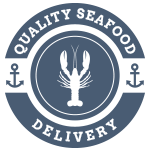Wild-caught king salmon is the best of the best when it comes to salmon. For taste and for nutrition, king (or Chinook) salmon gets top marks. The name comes primarily from their size. Mature king salmon are often somewhere between 24 to 36 inches in size and weigh about 10-50 lbs. The largest of the species may grow as large as 58 inches and may weigh 125 lbs or more, far bigger than any other salmon. The large size of individual king salmon is contrasted by the diminutive size of the overall population. Based on current figures, there may be fewer than 200,000 wild king salmon caught in Alaskan waters this year. This is out of a total harvest of more than 200 million wild Alaskan salmon. And while the Chinook used to be more common in the Pacific Northwest, they have all but vanished from the region.
| Company | $/lb | Min. Order Cost | Reviews | Rating | Website |
|---|---|---|---|---|---|
| Seabear Smokehouse | $29.00 | $299.00 | 273 | 5.0 | website |
| Global Seafoods | $38.00 | $190.00 | 1,130 | 4.6 | website |
| Wulf’s Fish | $44.00 | $44.00 | 764 | 4.9 | website |
| Sizzlefish | $44.27 | $154.95 | 341 | 4.9 | website |
| Fulton Fish Market | $59.97 | $38.37 | 606 | 4.4 | website |
| Vital Choice | OUT OF STOCK | OUT OF STOCK | 23,132 | 4.8 | website |
| Lummi Island Wild | $63.11 | $142.00 | 21 | 4.8 | website |
If you like salmon and have the opportunity or wherewithal to try wild king salmon, don’t miss out. Here is what you stand to miss out on. If you’re already sold on the idea, use this resource for comparison shopping and for buying king salmon.
What Makes Wild King Salmon Special?
King salmon are the biggest kind of salmon because they have to be. These salmon evolved to spawn further upriver and in watersheds with more powerful river currents. Their oil and fat content as well as their overall size are a direct effect of this evolutionary need. Fishermen typically choose their harvesting grounds in the ocean waters at the mouth of these rivers, just before the salmon begin their run when they are as meaty and fatty as they are ever going to be.
These king salmon runs are the longest, toughest in the world. In fact, in marketing their variety of king salmon, many companies will describe the length and power of the river system from where their king salmon is harvested. Along with their limited supply, it’s easy to understand why these salmon are the most coveted the world over. Chinook is sometimes described as “the Wagyu of the salmon world,” referring to the highly prized type of beef and steak.
Another unique quality of king salmon is that, in addition to the normal red color, there is also a variety of white king salmon, also called ivory king salmon. The only difference is the color; the taste and texture are the same.
Farm-Raised vs Wild-Caught King Salmon
Because it’s known for being the best salmon you can get, many people wrongly assume that all king salmon is wild-caught. A New Zealand company has its own special breed of farm-raised king salmon, known as Ora King Salmon. There are a couple other smaller king salmon farms and a very limited wild king salmon population in this region. Notably, New Zealand has tried to introduce several species of wild salmon; the king salmon is the only kind to survive and thrive.
The farm-raised variety comes close to the oil and fat content of wild Alaskan king salmon but still falls a little short. Likewise, farm-raised kings don’t have the same negative connotation and known contaminants as farm-raised Atlantic salmon, but it’s still not as highly coveted as wild-caught king salmon.
Take note of our Affiliate Relationships that may exist with this page and companies listed on it.

